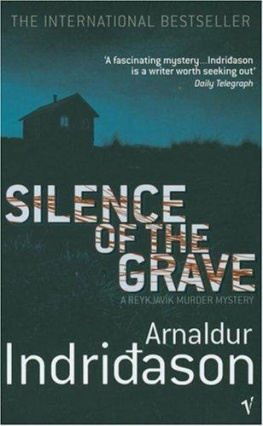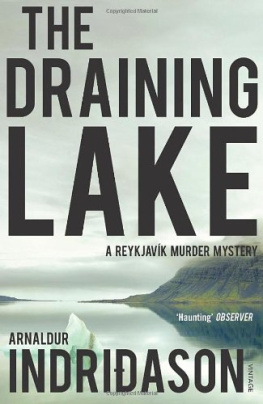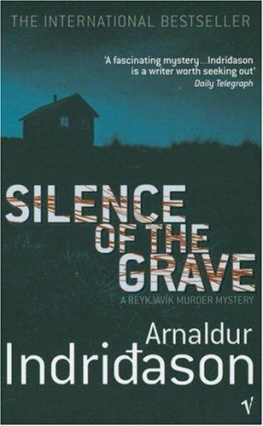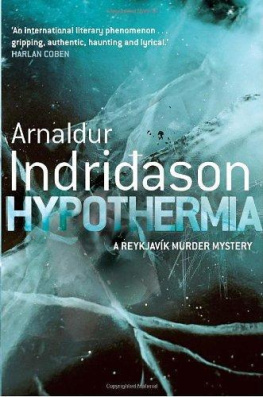Arnaldur Indridason - Black Skies
Here you can read online Arnaldur Indridason - Black Skies full text of the book (entire story) in english for free. Download pdf and epub, get meaning, cover and reviews about this ebook. year: 2012, publisher: Random House UK, genre: Detective and thriller. Description of the work, (preface) as well as reviews are available. Best literature library LitArk.com created for fans of good reading and offers a wide selection of genres:
Romance novel
Science fiction
Adventure
Detective
Science
History
Home and family
Prose
Art
Politics
Computer
Non-fiction
Religion
Business
Children
Humor
Choose a favorite category and find really read worthwhile books. Enjoy immersion in the world of imagination, feel the emotions of the characters or learn something new for yourself, make an fascinating discovery.

- Book:Black Skies
- Author:
- Publisher:Random House UK
- Genre:
- Year:2012
- ISBN:9781446485026
- Rating:5 / 5
- Favourites:Add to favourites
- Your mark:
- 100
- 1
- 2
- 3
- 4
- 5
Black Skies: summary, description and annotation
We offer to read an annotation, description, summary or preface (depends on what the author of the book "Black Skies" wrote himself). If you haven't found the necessary information about the book — write in the comments, we will try to find it.
Black Skies — read online for free the complete book (whole text) full work
Below is the text of the book, divided by pages. System saving the place of the last page read, allows you to conveniently read the book "Black Skies" online for free, without having to search again every time where you left off. Put a bookmark, and you can go to the page where you finished reading at any time.
Font size:
Interval:
Bookmark:
Arnaldur Indridason
Black Skies
1
He took the leather mask from the plastic bag. It had not turned out as he had intended; in fact, it was a bit of a botched job. But it would serve its purpose.
His greatest fear had been of running into a cop on the way, but in the event no one had paid him any attention. In addition to the mask, the plastic bag contained two bottles from the state off-licence and a suitably heavy hammer and metal spike bought from a DIY shop.
The materials for the mask had been purchased the day before from a wholesaler who imported leather and hides. Since he had known exactly what he needed he had no problem in acquiring the necessary leather, thread and strong wedge needle. He had made an effort to shave beforehand and put on the least shabby clothes he owned.
Realistically, there was little danger that he would attract any unwanted attention as it was early in the morning and there was barely a soul about. Head down, making sure not to catch the eye of any passer-by, he strode up to the wooden house on Grettisgata where he hurriedly descended the steps to the basement, opened the door and slipped inside, closing it carefully behind him.
Once inside he paused in the gloom, though by now he knew the layout of the flat so well that he could find his way around it in pitch darkness. It was not large: there was a windowless toilet to the right, off the hall, and the kitchen was on the same side with a big window that faced the back garden, which he had covered with a thick blanket. Directly opposite the kitchen was the sitting room and, beside that, the door to the bedroom. The sitting-room window faced on to the street but had heavy curtains drawn across it. So far he had only taken one quick glance into the bedroom, which had a single window, high up in the wall, blacked out by a bin bag.
Instead of turning on the lights he fumbled for the candle stub that he kept on a shelf in the hallway and lit it with a match, before following its eerie illumination into the sitting room. He could hear muffled cries coming from the old man tied to a chair with his hands bound behind his back and a gag over his mouth. Being careful to avoid even a glimpse of his face, especially his eyes, he put the bag down on a table and took out the hammer, mask, spike and bottles. Next he tore the seal off the brennivn and began eagerly gulping down the lukewarm spirit that had long since ceased to burn his throat.
Then he set the bottle down and picked up the mask. Only the finest materials had been used: thick pigskin, and seams double stitched with waxed sailmaking twine. He had cut out a round hole in the forehead to accommodate the galvanised-iron spike, then sewn a thick rim around it so that the spike would stand up unsupported. The sides of the mask had slits for a broad leather strap which could be tied tightly round the back of the head. There were also slits for the eyes and mouth. The top of the mask extended to the crown of the head and had a leather strap attached that could be tied in turn to the strap at the back of the neck to make sure the mask did not slip. He had not bothered to take precise measurements, working mainly from the size of his own head.
He took another swig of the spirit, trying not to let the old sods whimpering get to him.
There had been a mask like this on the farm when he was a boy, though it had been made of iron rather than leather. It was kept in the old sheep shed, and despite being forbidden to handle it, he had once managed to sneak a look. The iron, which was rusty in places, had felt cold to the touch, and he had noticed that there were dried bloodstains around the spike hole. He had only seen the mask used once, when the farmer destroyed a sick calf one summer. The farmer was far too hard up to own a gun, but the mask did its job. It was almost too small to fit over the calfs head and the farmer explained that it had been designed for sheep. The farmer had picked up his big hammer and struck the spike a single heavy blow which drove it deep into the calfs head. The animal collapsed on the spot and did not move again.
He had been happy there, in the countryside, where nobody ever told him he was a pathetic little wimp.
He had never forgotten what the farmer had called the headpiece with the spike which jutted out like the reminder of a quick and painless end. A death mask.
It was a chilling name.
He stared for a long time at the spike which protruded from his own ham-fisted effort. He had worked out that it would penetrate five centimetres into the skull, and he knew that this would be enough.
2
Sigurdur li let out a heavy sigh. He had been sitting in his car outside the flats for nearly three hours now. Nothing had happened: the newspaper was still in its place in the postbox. A few residents had come or gone but no one had so much as glanced at the paper, which he had purposely left sticking halfway out so that any passer-by could easily snatch it if they had a mind to. If they were a thief, in other words, or had some reason for wanting to upset the old woman upstairs.
As cases went, it was not exactly a challenge; in fact, it was the most trivial, tedious affair that Sigurdur li could remember since joining the police force. His mother had rung and asked him to do a favour for a friend who lived in a block of flats on Kleppsvegur, near Reykjavks northern shore. The friend had a newspaper delivered but when she went to fetch it on a Sunday morning she kept finding that it had vanished from her postbox in the communal lobby. She had had no luck in discovering the culprit herself, as her neighbours all swore blind that they had not taken it. Some even sneered that they would not touch such a crappy right-wing rag with a bargepole. In a way she agreed; she only really stayed loyal to the paper for the obituaries section that sometimes made up as much as quarter of its contents.
The friend had identified various suspects on her staircase. On the floor above, for example, there was a woman she believed to be one of those nymphomaniacs. There was a constant stream of men to her door, especially in the evenings and at weekends, and if not her, then no doubt one of them was the culprit. Another neighbour, two floors up, did not have a job but lounged around at home all day, claiming to be a composer.
Sigurdur li watched as a teenage girl entered the block, evidently on her way home from an all-nighter. She was still drunk and could not immediately find her keys in the small purse that she took from her pocket. She swayed, grabbing the door handle for support. She did not give the paper a second look. No chance of any photos of her in the Social Diary section, thought Sigurdur li, as he watched her stagger up the stairs.
He still had a touch of flu that was proving stubborn to shake off. No doubt it was his own fault for getting up too soon but he simply could not face languishing in bed, watching films on his 42-inch plasma screen any longer. It was better to be busy, even if he still felt grim.
His thoughts wandered back to last night. There had been a reunion party for his sixth-form class at the house of a guy known as Guffi, a conceited lawyer who had annoyed Sigurdur li almost from the day they met. It was typical of Guffi the kind of prat who used to turn up to school in a bow tie to invite them round to his place, ostensibly for the reunion but really, as he revealed in a breathtakingly pompous speech, to announce that he had recently been promoted to director of some division at his bank, and that this was as good an opportunity as any to celebrate that as well. Sigurdur li did not join in with the applause.
Looking discontentedly around the group, he wondered if he had achieved the least of all of them since leaving school. It was the kind of thought that preyed on him whenever he bothered to attend these reunions. The gathering included other lawyers like Guffi, as well as engineers, two vicars, three doctors who had completed lengthy training as specialists, and even an author. Sigurdur li had never read any of his stuff but they made a fuss of him in literary circles for his distinctive style that bordered on the irrational, in the jargon of the latest pseudo-intellectual school of criticism. When Sigurdur li compared himself to his former classmates his life in the force, the sort of investigations he was involved in, his colleagues Erlendur and Elnborg, and all the human dross he was forced to deal with every day he could find little reason to be cheerful. His mother had always said he was too good for
Font size:
Interval:
Bookmark:
Similar books «Black Skies»
Look at similar books to Black Skies. We have selected literature similar in name and meaning in the hope of providing readers with more options to find new, interesting, not yet read works.
Discussion, reviews of the book Black Skies and just readers' own opinions. Leave your comments, write what you think about the work, its meaning or the main characters. Specify what exactly you liked and what you didn't like, and why you think so.










